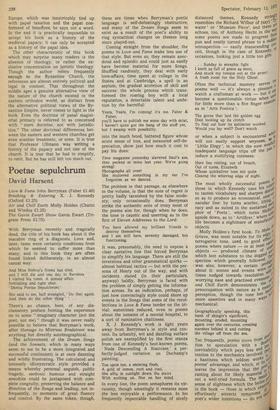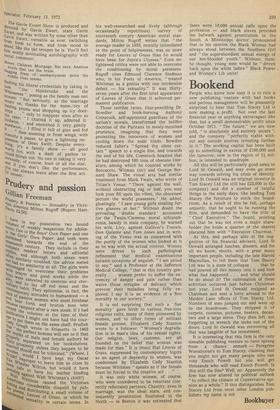Poetae sepulchrum
David Harsent
Love & Fame John Berryman (Faber £1.40) Breaking & Entering X. J. Kennedy (Oxford £1.25) Air and Chill Earth Molly Holden (Chatto and Windus £1.25) The Gavin Ewart Show Gavin Ewart (Trgram Press £1.75) With Berryman recently and tragically dead, the title of his book has about it the macabre ring of a diagnosis. Love and, later, fame were certainly conditions from which he seemed to suffer more than many, and in this book they are often found linked, deliberately, in an almost casual way: And Miss Bishop's friend has died, and I will die and one day in Ravenna I visited his tomb. A domed affair, forbidding and tight shut.
Dantis Poetae Sepulchrum.'
She said to me, half strangled, ' Do that again.
And then do the other thing' . .
There's no chance, here, of any disclamatory preface foisting the experience on to some "imaginary character (not the poet, not me) " though it was never really possible to believe that Berryman's work, after Homage to Mistress Bradstreet was anything but directly autobiographical.
The achievement of the Dream Songs (and the Sonnets, which in many ways seem to me to be a more integrated and successful continuum) is at once daunting and wildly frustrating. The calculated and intensely idiosyncratic style provided a means whereby personal anguish, public tragedy, sardonic humour and straight anecdote could be juxtaposed with complete congruity, preserving the balance and direction of the Songs and leading, not infrequently, to moments of great fluency and control. By the same token, though, these are times when Berryman's poetic language is self-defeatingly obstructive; and many of the Dream Songs seem to exist as a result of the poet's ability to ring syntactical changes on themes long since played-out.
Coming straight from the shoulder, the poems in Love and Fame make less use of that style. But even so, they remain anecdotal and episodic and could just as easily have become material for more Songs. Shuffled randomly, they deal with early love-affairs, time spent at college in the States and at Cambridge, a spell in an asylum, the gradual accretion of skill and success: the whole process which transformed the roaring boy with a local reputation, a detectable talent and ambition by the barrelful:
Yeats, Yeats, I'm coming! it's me. Faber & Faber, you'll have to publish me some day with éclat, I haven't quite got the hang of the stuff yet, but I swamp with possibility,
into the much feted, battered figure whose acute sense of loss, and measured self-deprecation, show just how much it cost to pay his dues:
Time magazine yesterday slavered Saul's ass, they pecked at mine last year. We're going strong!
Photographs all over!
She muttered something in my ear I've forgotten as we danced.
The problem in that passage, as elsewhere in the volume, is that the note of regret is pretty badly tarnished by the false modesty; only occasionally does Berryman strike the authentic note of irony most of the poems aim for, though when he does, the tone is caustic and unerring as in the first of Eleven Addresses to the Lord: You have allowed my brilliant friends to destroy themselves
and I am still here, severely damaged, but functioning.
It was, presumably, the need to expose a clear narrative line that forced Berryman to simplify his language. There are still the inversions and other grammatical quirks — almost habitual tactics — but with the persona of Henry out of the way, and with incidents stated (in their particulars, anyway) baldly, Berryman is faced with the problem of simply getting the information across. Its an indication, perhaps, of just how convincingly style could shore up events in the Songs that some of the recollections in Love & Fame border on the trivial: sometimes reduced, even in poems about the inmates of a mental hospital, to a sort of ruminative chattiness.
X. J. Kennedy's work is light years away from Berryman's in style and content. Its urbanity, wit and dazzling surface polish are exemplified by the first stanza from one of Kennedy's best-known poems, ' Nude Descending A Staircase,' a perfectly-judged variation on Duchamp's painting: Toe upon toe, a snowing flesh, A gold of lemon, root and rind, She sifts in sunlight down the stairs With nothing on. Nor on her mind.
In every line, the poem semaphores its virtuosity, though amazingly it remains none the less enjoyable a performance. In his frequently impeccable handling of nicely Spectator, February 12, 1912 distanced themes, Kennedy stronglY resembles the Richard Wilbur of (say) water' or 'Museum Piece', and there echoes, too, of Anthony Hecht in the Wa_Y some poems are made to progress frornti pun and neatly turned phrase to a sudden introspection — easily transcending CO r: ceit, though in the case of KennedY, ° occasions, looking just a little too glib: . . Sunday in seraphic light
I knelt as full of grace as most, And stuck my tongue out at the priest:
A fresh roost for the Holy Ghost. the Often the technical mastery serves to poems well — it's always a pleasurepo watch a craftsman at work — but it "oo become a questionable virtue when ti.sse, for little more than a five finger exercl as in 'Arts Poetica
The goose that laid the golden egg Died looking up its crotch To find out how its sphincter worked. Would you lay well? Don't watch.
or when a subject is encountered W will not easily support wryness, aSfulty 'Little Elegy ', in which the now ‘s°e to inadequate language trips off the Pen induce a stultifying cuteness:
Here lies resting, out of breath, Out of turns, Elizabeth Whose quicksilver toes not quite
Cleared the whirring edge of night. upside down, as to Artificer,' ,„,,here Pule: The most wholly successful poemcrl so as to produce an economical, near, or phor of ' Poets ', which turns 1V131„ror. life becomes a nightmare of manufac to tauten vocabulary and sharpen deliver racy and as suited to the sustained 17410 those in which Kennedy uses his Ni.lister,' nacu1ar line: by turns acerbic, /iltir),,eet5; objects. ize Molly Holden's first book, To —a v Grieve, was most notable for its e,c,dg'ct terrogative tone, used to good eue,t00 poems where nature — or at least objects — produced climate ocjiptic which lent substance to the dogge: spection which generally followed fie( was also, however, a certain Pr° soiri about it: scenes and events were ,411' times nudged towards resolution v"ss, worrying ease and practised evenrie 01: and Chill Earth demonstrates the001• preoccupation with nature as a Illebeco perception, though the tone has more assertive and in many WO' mechanical: Geographically speaking, this bank of shingle's significant,
mounting, eroded, mounting again over the centuries, creating marshes behind it and cutting
the village off from the sea. des61,• Too frequently, poems move from tion to speculation with a dealess inevitability which pays less and ther, tention to the mechanics involveu: to a hastiness which seldom worl,s poems' advantage, and which, at "„0-et lei leaves the impression that the ?to ri casting about for likely material out a well-tried formula. The re51.94 sense of slightness which the betteerv81;: in the book — those in which OS of e effortlessly attracts symptoms de0 poet's wider intentions — do Ilt)t 111,_ aod, like the old trouper he is. You'll find directed by Gavin Ewart, stars Gavin Evvart, and was written by none other than G, aviri Ewart, versatile as ever, switching trohli form to form, and from mood to social comment: uhrl neatly dovetailing autobiography with The Gavin Ewart Show is produced and Money. Children. Mortgage. Rat race. Anxious _Words that tax the brain. Nagging fears of unemployment the Middle class insane. flashing his liberal credentials by taking to task "the Holebrooks and the Whitearses ", posing as the family man one r)finute: " But seriously, as the marriage twears on, thanks for the mem-/ory of sratiling prams and shopping up icy doorthe ' • " only to reappear soon after as L. rake: "I chatted it up, admired it uirdwise, / and smoothed it very gently iwt°rclwise., / I filled it full of gins and fed S • • ." then zooming in from wings, with ,erarcely a pause, to give a lightning imtVssioh of Dean Swift. Despite everyL'Ing, it's a family show — all good ,art ;y f with a dash of pathos to r ti.nd things out. No one is taking it very saerio „--1.18LY, of course, least of all the star, 3,-0"u if you don't like the performance, Can always or eau always leave after the first act.











































 Previous page
Previous page